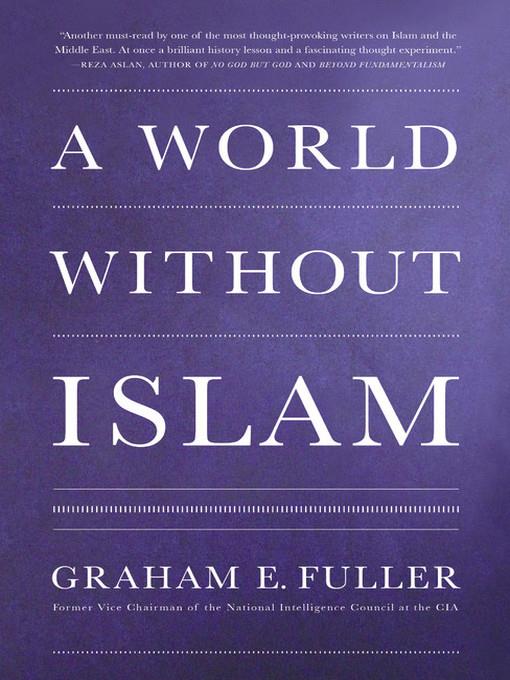
A World Without Islam
کتاب های مرتبط
- اطلاعات
- نقد و بررسی
- دیدگاه کاربران
نقد و بررسی

May 31, 2010
In this wide-ranging historical text, Fuller, former vice chairman of the National Intelligence Council at the CIA, suggests that many of the current tensions that exist between the East and the West have geopolitical rather than religious origins and that these tensions would have arisen in a "world without Islam." The author opens the book with a theological analysis that emphasizes the continuities among the three Abrahamic faiths. He then pivots to an extended history of the Christian world that focuses on the conflict between Latin and Byzantine Europe, pointing out that the schism between them largely motivated the Crusades. The book then covers the relationship of Islam to Russia, India, and China before turning to the Muslim world specifically, surveying its centuries-long decline from a position of cultural, political, and economic dominance. Fuller covers an extraordinary number of subjects lucidly, and whether readers are persuaded by his valorization of geopolitics above religion, he cogently lays out the complex causes of contemporary conflicts and makes bold policy recommendations that move conversations about East-West relations beyond religious and ideological divides.

June 1, 2010
Without the establishment of Islam, writes former CIA official Fuller (New Turkish Republic: Turkey As a Pivotal State in the Muslim World, 2007, etc.), the religion of the East would predominately still be Eastern Orthodox Christianity, and probably as hostile to the West as it was before the fall of Constantinople.
In focusing all its rage against Islam in the pursuit of the eradication of terrorism, the West has lost sight of the key role of "geopolitical considerations of power" over theological differences. Islamism, rather than Islam, has become just one of many ideological vehicles employed against Western interventionism, imperialism and colonialism, and the rise of its new forms of resistance—fundamentalism and terrorism—is as predictable as, say, the Reformation grievances against the Catholic Church. The author provides a broad, far-flung survey of historical currents that have fed the West-East divide, namely how the early centuries of peaceful Christian conversion in the Middle East gave way to orthodoxy and the organization of a state structure in the form of the Byzantine Empire, which broke with Rome and vigorously suppressed "a smorgasbord of heresies." The relatively recent religion on the scene, Islam, united dissonant tribal entities of the region and opened Islam to non-Arabs, an organic development that Fuller views as "an important process of fusion." The author considers the Crusades as an expansionist move by the West, in response to external marauding forces, and demonstrates how the breakaway elements in the Protestant Reformation "opened the door" to more liberal (or literal) interpretations of orthodoxy, in much the same way that modern Islamist movements have broken away from (or adhered more strictly to) the Islamic party line. Fuller offers a useful survey of Muslim communities in Russia, India and China, and looks at how Islam—rather than Arab nationalism, for example—has become today's tool in resistance to the West.
A cogent argument demonstrating that a knowledgeable awareness of the rich dynamics that drive societies will better help diffuse tensions.
(COPYRIGHT (2010) KIRKUS REVIEWS/NIELSEN BUSINESS MEDIA, INC. ALL RIGHTS RESERVED.)

May 1, 2014
If Muhammad's revelations had never happened, would the United States and the Muslim world still feel such animosity? Fuller contends that culture, not religion, is the central issue in this conflict.
Copyright 2014 Library Journal, LLC Used with permission.

Starred review from August 1, 2010
Challenging commentators who regard Islam as the seedbed of anti-Western terrorism, Fuller argues that the perilous tensions between the West and the Middle East spring from nonreligious sources, not Islamic theology. Fuller defends his provocative thesis by showing that long before Muhammad, the peoples of the Middle East viewed the Western powers as interlopers. Readers explore, in particular, the ways the eleventh- and twelfth-century Christian crusaders against Islam were replaying scripts written by Roman Catholic authorities, who suppressed heresies in the Levant and then waged doctrinal war against the patriarchs of Eastern Orthodoxy. The persistence of pre-Islamic resentments surfaces most tellingly in the willingness of Catholic crusaders to ignore the Muslims long enough to sack the Christian (but Eastern Orthodox) city of Constantinople for political and economic reasons. These reasons for regional conflict continued, as Fuller illustrates, after the Protestants revolt and Russias emergence as a new Byzantium. Fuller thus dares to suggest that overcoming the twenty-first-century anti-Western animosities of Middle Eastern Muslims requires an honest and historically informed assessment of economic and political inequities that moves us beyond a fixation on religious issues. This exceptional inquiry finally sustains a quite specificand controversialset of recommendations for reframing American foreign policy.(Reprinted with permission of Booklist, copyright 2010, American Library Association.)

























دیدگاه کاربران